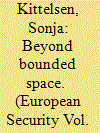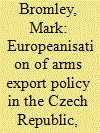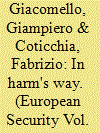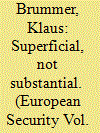|
|
|
Sort Order |
|
|
|
Items / Page
|
|
|
|
|
|
|
| Srl | Item |
| 1 |
ID:
079724


|
|
|
|
|
| Publication |
2007.
|
| Summary/Abstract |
The threat of pandemic spans beyond traditional security concerns to challenge conventional understandings of urgency, power, the threat-defence dynamics of states and the protection of sovereignty itself. This paper argues that confronting this non-conventional threat in Europe requires not only moving beyond a linear understanding of the proximity of threat across space and time to recognise the global circulation of disease, but also a reconceptualisation of how Europe is understood. In effectively confronting the challenge of infectious disease to the region, Europe needs to be understood less as a territorially bounded space, and more as a dynamic and fluid one, constituting a node within broader interdependent systems of circulation
|
|
|
|
|
|
|
|
|
|
|
|
|
|
|
|
| 2 |
ID:
079728


|
|
|
|
|
| Publication |
2007.
|
| Summary/Abstract |
This article examines changes in the level of transparency and the outcomes of arms export policies in the Czech Republic, Poland, and Slovakia since they joined the EU in May 2004, and determines the extent to which these changes are attributable to the 'Europeanisation' of this policy area. Following the approach of the existing literature, this article views the Europeanisation of EU arms export policy as the process by which certain key policy structures and decision-making processes become increasingly subject to systems of multi-level governance. The article finds that while Europeanisation has led to an increase in arms export policy transparency, its impact on arms export policy outcomes is harder to detect. At most, Europeanisation has been one of a range of factors driving change in this area
|
|
|
|
|
|
|
|
|
|
|
|
|
|
|
|
| 3 |
ID:
079726


|
|
|
|
|
| Publication |
2007.
|
| Summary/Abstract |
Despite the risk of disastrous outcomes, time and again, advanced democracies have sent their soldiers abroad to dangerous places. They do so not out of necessity (i.e. self-defence), but choice (e.g. humanitarian intervention). What motivates political leaders to accept the risks of such actions? This heuristic study examines three diverse cases in which a medium-sized, advanced democracy, Italy, decided to deploy its troops abroad. It did so because it was both a way to foster its standing in world affairs and a deeply felt, 'moral' commitment to international law. This conclusion can probably be applied to several other democracies such as Germany, Canada or Sweden.
|
|
|
|
|
|
|
|
|
|
|
|
|
|
|
|
| 4 |
ID:
079725


|
|
|
|
|
| Publication |
2007.
|
| Summary/Abstract |
Since the 'Orange Revolution' Ukraine has been engaged in a comprehensive programme of naval transformation aimed at building an effective coastal defence navy able to protect its maritime interests in the Black Sea: an efficient and well run Ukrainian coastal navy that is inherently defensive in orientation can maintain good order at sea and protect Ukraine's security and can also make an important contribution to regional security and stability. Over the last few years Ukraine has been making steady progress in developing a balanced, flexible and deployable coastal navy able to engage in a full spectrum of defence activities. However, continued progress is likely to be hampered in the medium term by the high cost of naval transformation, the challenges of democratic consolidation and friction between Russia and Ukraine in the Black Sea
|
|
|
|
|
|
|
|
|
|
|
|
|
|
|
|
| 5 |
ID:
079727


|
|
|
|
|
| Publication |
2007.
|
| Summary/Abstract |
Surveys such as the European Commission's Eurobarometer regularly reveal high levels of public support for European Security and Defence Policy (ESDP). This paper argues, however, that public support for ESDP is only superficial, not substantial. First, there is no homogeneous 'European' public support for ESDP. Second, security and defence, as covered by ESDP with its focus on global crisis-management, rank very low among Europeans' priorities. Third, Europeans are very sceptical about the appropriateness of military means, and hence a core element of ESDP, as a legitimate instrument in international affairs. These reservations are likely to have constraining effects on ESDP's future development. At the same time, there are compelling reasons for the further development of ESDP. Therefore, Europe's political elites should initiate a public diplomacy campaign inside the EU in which the case for Europe's further evolution as a strategic security and defence actor is made. ESDP operations are the most promising starting points as they illustrate both the normative and the 'realist' necessities of European engagement in global security affairs
|
|
|
|
|
|
|
|
|
|
|
|
|
|
|
|
|
|
|
|
|